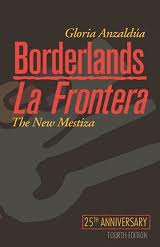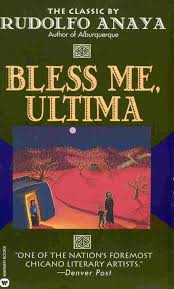In Bless Me, Ultima there is ongoing conflict within the Márez-Luna family in regards to their diverse histories, beliefs, customs, and lifestyles. These varied backgrounds that exist between the patriarch, Gabriel Márez, and his wife, María Luna, not only creates tension in their relationship and home life, but also produces confusion for their children. The Márezes come from the conquistadores across the sea and roam the llano on horses, living a life full of freedom. The Lunas live a quiet, deeply-rooted, stable farming life in El Puerto and value spirituality. In the Márez-Luna household the two lineages are often pit against each other, the characteristics of one of the bloodlines is usually praised while the other is criticized. Antonio and the other Márez-Luna children are a hybrid of the two lineages, being from both, yet not fully belonging to either. This idea can be described as the “third space” or the “consciousness of the Borderlands” as theorized by the late scholar, Gloria Anzaldúa. She writes that when one is mixed, or is a mestizaje of races/cultures, their “chromosomes [are] constantly “‘crossing over’” (99). As this is displayed with Antonio and his family, this is representative of the Chicano experience: being of mixed indigenous and Spanish ancestry and being from both sides of the border, not fully belonging to either racial group or on either side of the border.
In the Márez-Luna family, the older sons have the behavioral traits of their Márez lineage and Antonio’s personality has more of a resemblance to the Luna side. He is expected to follow their path of being a priest and farmer. His mother and her family see him as their “last hope” since the eldest sons took a different road. His father prefers the ways of his own people. Antonio witnesses his parents’ disagreements and is sent mixed messages from the two. Antonio’s “mental nepantilism” (nepantla is an Aztec/Nahautl word meaning torn between ways) (100) more fully comes to the surface when he begins to question the power of the Catholic/Christian God. His dying uncle Lucas is healed by Ultima’s powers, while the priest was unable to cure him. The conflict between Catholicism/Christianity and “paganism” exists, as they are contradictory beliefs and he is not supposed to believe in both of them. This heightens after he sees the golden carp. How can he believe in both the Almighty and in the golden carp, how can Catholicism/Christianity and indigenous beliefs coincide with each other? This too, has historically been an issue for Chicanos’ indigenous ancestors after the Spanish conquest, and then again in the United States where Catholicism was demonized and Protestantism was revered.
While the Márez-Lopez family is divided with their family backgrounds and what they see as being the best way of life, the wise curandera, Ultima, encourages the unity of the two different cultures. She prays to the Virgin Guadalupe, attends mass, and follows indigenous ways of healing. When searching for herbs and roots with Antonio, she teaches him about both sides of his family histories and incorporates both indigenous and Moorish/Spanish healing herbs. The concept of mestizaje is described in Antonio’s dream, when his parents are disputing about the significance of the waters and their own bloodlines. Ultima encourages the melding of the two different lineages when she tells them,
“You both know…that the sweet water of the moon which falls as rain in the same water that fathers into rivers and flows to fill the seas. Without the waters of the moon to replenish the oceans there would be no oceans. And the same salt waters of the oceans are drawn by the suns to the heavens, and in turn become again the waters of the moon. Without the sun there would no waters formed to slake the dark earth’s thirst.
The waters are one, Antonio. I looked into her bright clear eyes and understood her truth.
You have been seeing only parts, she finished, and not looking beyond into the great cycle that binds us all” (Anaya 121).
Ultima is reminding them that both sides need each other. Bringing the two together will only make Antonio stronger. He should not have to choose one or the other, but embrace both. Later in the novel as Antonio’s father is taking him to El Puerto to spend the summer with the Lunas, his father discusses how maybe it is time for he and his wife to give up on their differences. Antonio states, “Then maybe I don’t have to be just Márez, or Luna, perhaps I can be both…Take the llano and the river valley, the moon and the sea, God and the golden carp—and make something new” (247). While Antonio is both Luna and Márez: both Spanish and indigenous, he is also not fully either one. By embracing the mestizaje he is creating the third space, “something new.” As with Chicanos who have historically experienced the third space as mestizos in Mexico, and then again in the United States as being Mexican-American (once again, never fully belonging to either side), Antonio can “continually walk out of one culture/and into another,/because [he is] in all cultures at the same time” (Anzaldúa 99). Antonio is trying to work through his sense of nepantla and not feel torn about who he is. He is from both the moon and lake and sun and sea.
Written at the time of the Chicano Movement, Anaya’s depiction of this Chicano family accurately displays the issues and struggles that Chicanos face in regards to their mixed racial, spiritual, linguistic, and geographical histories and experiences within the United States. Just as Antonio had to straddle the concepts of being from the sun and sea and the moon and lake, and what that meant, Chicanos struggle with the Borderlands consciousness of their sense of belonging and identity.
(Desert Border Image Credit: http://blogs.cofc.edu)
Works Cited:
Anaya, Rudolpho. Bless Me, Ultima. New York: Warner Books, 1972. Print.
Anzaldúa, Gloria. Borderlands/La Frontera: The New Mestiza. San Francisco: Aunt Lute Books, 2012. Print.




The conflicting tradition of the two families definitely does parallel the conflicting traditions that Chicanos have to deal with. Why do we always have to be one or the other? I think it is because people are easier to understand when they stick to one way of life. The problem with this is that people are constantly evolving and changing their identity. That is true of Chicanos in America. The struggle between balancing American and Mexican culture promoted an evolution of Chicano culture. It is finding that balance so that all parts are represented in a way that suits the individual. For Antonio, he had to find the balance that represented his mother’s and father’s family heritage.
I can definitely identify with the struggle that comes with being torn by two different cultures and trying to find a harmonious balance amid that ambiguity. I believe most immigrants experience a latent sense of cultural loss as the years away from home accumulate. One feels like the new slowly replaces the native and that can be very troubling. I imagine that for Antonio it must be a lot harder since he belongs to this country but is still marginalized and cannot fully connect with the mainstream culture. The author ingeniously mirrors the hybrid Chicano experience with Antonio’s familial divisions. I particularly enjoyed your analysis of this competing factions within his home unit and how distinctively opposing they are. If joint together, the Lunas and Márez identities could form a complete individual blessed with spiritual awareness, reliance, familial loyalty and a fierce autonomy. Ultima sees the strength on the marriage of these rival clans. As you mentioned, her wisdom allows her to recognize the merit of unity over dispute; she understands that the only way of gaining true serenity is through compromise. She teaches Antonio the valuable lesson of embracing his seemingly contradicting sides ( the Luna-Márez and the American-Mexican) to achieve a more realized selfhood. Her impressive powers and selflessness show that through acceptance of all aspects of life, this woman is able to thrive as a curandera and as a caring and useful individual. I appreciate that secondary source you included in your post, I think the coined term of “mental nepantilism” is an interesting way of getting to the core of this issue and I will sure check out that article.
This blog post tackles Antonio’s identity struggle between being a Marez or Luna, his father’s and mother’s side respectively. I agree with many of the points explained in this post because Antonio does struggle with not only his family identity, but religious identity as well. I do agree that antonio seemingly decided to take the characteristics of the Marez and the Luna, to truly be both his parents child. Unlike his older brothers who were overwhelmingly Marez, Antonio conformed to the Luna side as well to create his own image. Furthermore Antonio, as a seven year old, was wise enough to believe in what he wants to believe in, instead of being conformed by society, or family traditions. If he believes in the Almighty God, but also believes in Ultima’s craft, then maybe both traditions have some truth to it, and its is choice to believe in both, which isn’t wrong.